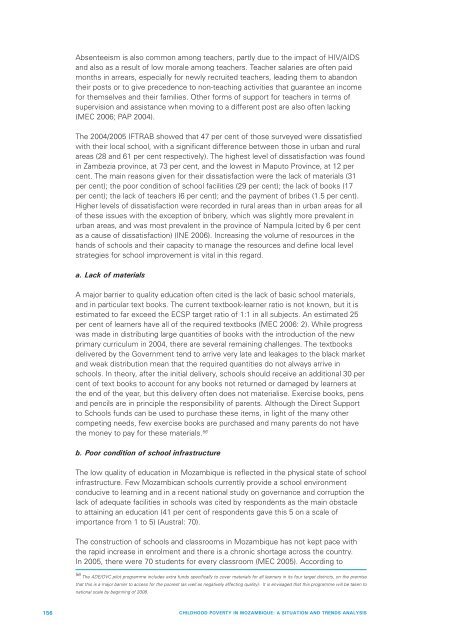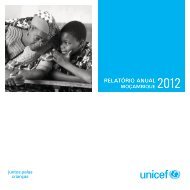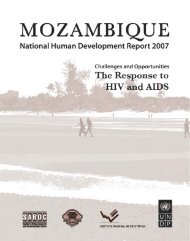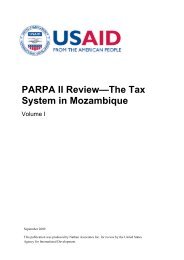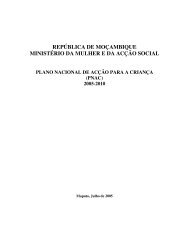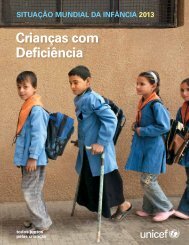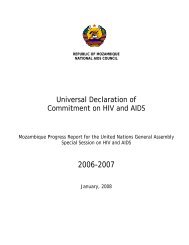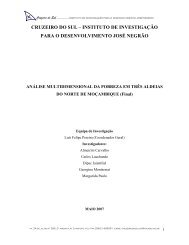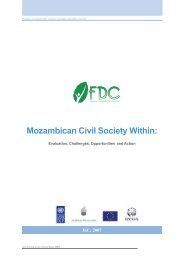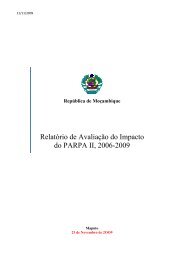Child Poverty in Mozambique. A Situation and Trend ... - Unicef
Child Poverty in Mozambique. A Situation and Trend ... - Unicef
Child Poverty in Mozambique. A Situation and Trend ... - Unicef
You also want an ePaper? Increase the reach of your titles
YUMPU automatically turns print PDFs into web optimized ePapers that Google loves.
Absenteeism is also common among teachers, partly due to the impact of HIV/AIDS<br />
<strong>and</strong> also as a result of low morale among teachers. Teacher salaries are often paid<br />
months <strong>in</strong> arrears, especially for newly recruited teachers, lead<strong>in</strong>g them to ab<strong>and</strong>on<br />
their posts or to give precedence to non-teach<strong>in</strong>g activities that guarantee an <strong>in</strong>come<br />
for themselves <strong>and</strong> their families. Other forms of support for teachers <strong>in</strong> terms of<br />
supervision <strong>and</strong> assistance when mov<strong>in</strong>g to a different post are also often lack<strong>in</strong>g<br />
(MEC 2006; PAP 2004).<br />
The 2004/2005 IFTRAB showed that 47 per cent of those surveyed were dissatisfied<br />
with their local school, with a significant difference between those <strong>in</strong> urban <strong>and</strong> rural<br />
areas (28 <strong>and</strong> 61 per cent respectively). The highest level of dissatisfaction was found<br />
<strong>in</strong> Zambezia prov<strong>in</strong>ce, at 73 per cent, <strong>and</strong> the lowest <strong>in</strong> Maputo Prov<strong>in</strong>ce, at 12 per<br />
cent. The ma<strong>in</strong> reasons given for their dissatisfaction were the lack of materials (31<br />
per cent); the poor condition of school facilities (29 per cent); the lack of books (17<br />
per cent); the lack of teachers (6 per cent); <strong>and</strong> the payment of bribes (1.5 per cent).<br />
Higher levels of dissatisfaction were recorded <strong>in</strong> rural areas than <strong>in</strong> urban areas for all<br />
of these issues with the exception of bribery, which was slightly more prevalent <strong>in</strong><br />
urban areas, <strong>and</strong> was most prevalent <strong>in</strong> the prov<strong>in</strong>ce of Nampula (cited by 6 per cent<br />
as a cause of dissatisfaction) (INE 2006). Increas<strong>in</strong>g the volume of resources <strong>in</strong> the<br />
h<strong>and</strong>s of schools <strong>and</strong> their capacity to manage the resources <strong>and</strong> def<strong>in</strong>e local level<br />
strategies for school improvement is vital <strong>in</strong> this regard.<br />
a. Lack of materials<br />
A major barrier to quality education often cited is the lack of basic school materials,<br />
<strong>and</strong> <strong>in</strong> particular text books. The current textbook-learner ratio is not known, but it is<br />
estimated to far exceed the ECSP target ratio of 1:1 <strong>in</strong> all subjects. An estimated 25<br />
per cent of learners have all of the required textbooks (MEC 2006: 2). While progress<br />
was made <strong>in</strong> distribut<strong>in</strong>g large quantities of books with the <strong>in</strong>troduction of the new<br />
primary curriculum <strong>in</strong> 2004, there are several rema<strong>in</strong><strong>in</strong>g challenges. The textbooks<br />
delivered by the Government tend to arrive very late <strong>and</strong> leakages to the black market<br />
<strong>and</strong> weak distribution mean that the required quantities do not always arrive <strong>in</strong><br />
schools. In theory, after the <strong>in</strong>itial delivery, schools should receive an additional 30 per<br />
cent of text books to account for any books not returned or damaged by learners at<br />
the end of the year, but this delivery often does not materialise. Exercise books, pens<br />
<strong>and</strong> pencils are <strong>in</strong> pr<strong>in</strong>ciple the responsibility of parents. Although the Direct Support<br />
to Schools funds can be used to purchase these items, <strong>in</strong> light of the many other<br />
compet<strong>in</strong>g needs, few exercise books are purchased <strong>and</strong> many parents do not have<br />
the money to pay for these materials. 56<br />
b. Poor condition of school <strong>in</strong>frastructure<br />
The low quality of education <strong>in</strong> <strong>Mozambique</strong> is reflected <strong>in</strong> the physical state of school<br />
<strong>in</strong>frastructure. Few Mozambican schools currently provide a school environment<br />
conducive to learn<strong>in</strong>g <strong>and</strong> <strong>in</strong> a recent national study on governance <strong>and</strong> corruption the<br />
lack of adequate facilities <strong>in</strong> schools was cited by respondents as the ma<strong>in</strong> obstacle<br />
to atta<strong>in</strong><strong>in</strong>g an education (41 per cent of respondents gave this 5 on a scale of<br />
importance from 1 to 5) (Austral: 70).<br />
The construction of schools <strong>and</strong> classrooms <strong>in</strong> <strong>Mozambique</strong> has not kept pace with<br />
the rapid <strong>in</strong>crease <strong>in</strong> enrolment <strong>and</strong> there is a chronic shortage across the country.<br />
In 2005, there were 70 students for every classroom (MEC 2005). Accord<strong>in</strong>g to<br />
56 The ADE/OVC pilot programme <strong>in</strong>cludes extra funds specifically to cover materials for all learners <strong>in</strong> its four target districts, on the premise<br />
that this is a major barrier to access for the poorest (as well as negatively affect<strong>in</strong>g quality). It is envisaged that this programme will be taken to<br />
national scale by beg<strong>in</strong>n<strong>in</strong>g of 2008.<br />
156 CHILDHOOD POVERTY IN MOZAMBIQUE: A SITUATION AND TRENDS ANALYSIS


